#my problem is with this like fervor without much content or expertise. also it feels like a way for some interests to undermine schools
Explore tagged Tumblr posts
Text
can i be mean for a second. it's great that people care & are thinking seriously about literacy education but i think it's sort of embarrassing that everyone's main source is a podcast. also a podcast cannot possibly make you an expert in the complicated social, developmental, & pedagogical questions of reading education. i really think a lot of what's happened is that it's compelling to imagine that we can resolve a profound social problem with a skill that many of us learned as young children (phonics!). in my experience, this narrative has specifically conservative appeal. none of this to say that i think we should toss out every neuropsych paper about literacy acquisition or whatever, but i do insist that there's a difference between the 'science of reading' as an evolving body of knowledge & practice and the (contentious & also evolving, lol) popular idea of what literacy education at any level ought to look like. also, um, did they ever fix that replication crisis, or
#haven't listened to the podcast i'm sure it's great i'm not a podcasts guy but i really have no problem with the podcast itself#my problem is with this like fervor without much content or expertise. also it feels like a way for some interests to undermine schools#not arguing the general conclusion that many schools have been doing the wrong thing! just saying like: not loving the public conversation#maybe other places do not have weirdo conservative local orgs trying to run lightly supervised phonics tutoring w/o credentials??#also 'science of reading' is now basically a buzzword but i don't think it's been accompanied by a robust public understanding -#of literacy acquisition. which is actually more or less fine imo! if you're a parent read with your kid & engage with them#if you're a teacher seek prof dev. everyone else um mind your own business? be kind to people around you??#maybe flex those phonics skills by reading some of the papers we're all so proud to vaguely know about idk#perhaps notice their methodological limitations & specific frameworks. consider how contingent our knowledge is.#feel free to argue with me i'm sure i'm being unjust &/or ornery here! would love recs if you have them
8 notes
·
View notes
Text
M*A*S*H: The Characters, Part 3: Frank Burns, Radar O’Reilly, Maxwell Klinger, and Father Francis Mulcahy
While characters like Hawkeye and Margaret grew and changed, and other characters, like Trapper and Henry, moved on (in one way or another), some characters found themselves doing neither: rather, stagnating, before in a way, moving backwards.
Such is the unlucky fate of Major Frank (Ferret Face) Burns (Larry Linville).
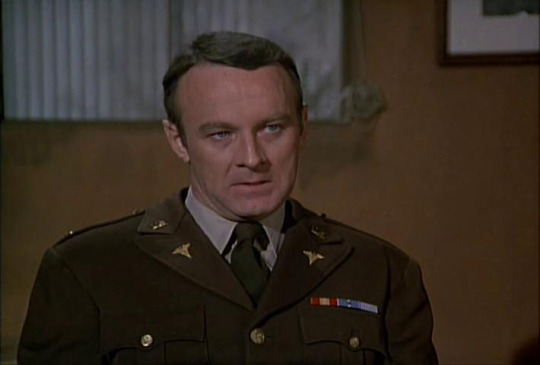
Frank was everything unlikeable about humanity without going quite so far as to be evil. Hailing from Fort Wayne, Indiana, Frank had a wife and kids back home that he didn’t seem to care much for, choosing instead to have an affair with Major Margaret Houlihan, the only other person who could stand his company. A Dr. Jerk if there ever was one, Frank’s lack of bedside manner (and even lack of surgical expertise) could make him a liability, not to mention his incredibly strict sense of military discipline, even when it didn’t make any sense. Definitely The Friend No One Likes, Frank originated as a Foil for Hawkeye, another Gung Holier Than Thou type who put all his faith and trust in the army. Greedy and self serving, and always seeking to climb the ranks, Frank was The Neidermeyer, a huge stickler for army rules and constantly trying to enforce them, but not possessing any of the guts to go with the army worship
And we’re not even close to done with his problems.
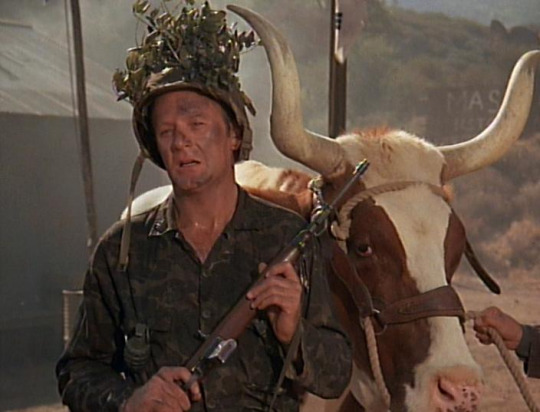
Frank’s job was to represent the dangers of blind patriotism and military fervor. A Leader Wannabe on top of being a Lawfully Stupid Hate-Sink, Frank existed to make mistakes, act childishly, and overall be a thorn in the side of the 4077th. In early seasons, he would often pair with Margaret in order to ‘take down’ whatever operation Hawkeye and Trapper had going, but as time went on, and Margaret left him for her fiancé, Frank became more and more pathetic, and by the time B.J. came aboard to replace Trapper, Frank had lost all weight and depth as a character entirely. His racism and sexism were getting played so ridiculously exaggeratedly, as well as his numerous other flaws, that he was quickly losing any threat as an antagonist, and even his Freudian Excuse of a miserable childhood wasn’t lending him much sympathy.
Without Margaret to back him up, Frank became more ineffective as an ‘antagonist’ character, or even a foil, quickly turning into a universal Butt Monkey and the show’s Chew Toy. With scarce a victory to his name, and quickly turning into a caricature of his own, already exaggerated, character, Frank had nowhere to go but down, devolved to a point of cartoonish buffoonery that there was no bouncing back from. To make things worse, the show was maturing, without him, with more nuanced characters like B.J. Hunnicutt replacing Trapper, and Reasonable Authority Figure Colonel Sherman Potter taking the place of the incompetent pushover Henry Blake, Frank was rapidly becoming lost in a show that was becoming more serious and realistic. As a result, at the end of season five, after Margaret’s marriage, Frank Burns went the way of Trapper and Henry, and left the show: albeit in a completely different way.
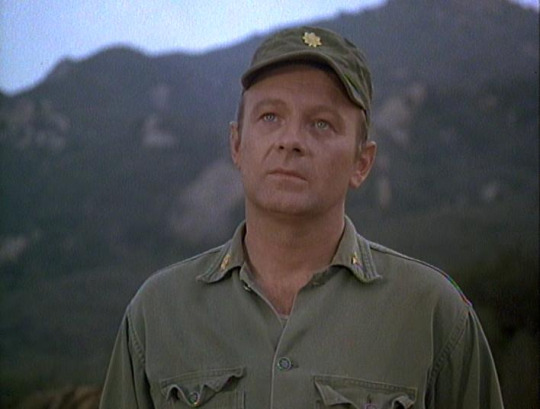
In the pilot two-part episode of season six, Frank Burns goes on leave in Tokyo, and (over the telephone, as Larry Linville doesn’t appear at all in the episode) the audience, and the 4077th, are treated to hearing Frank’s mental breakdown following Margaret’s marriage. After attacking a general and his wife (who resembled Margaret), he’s apprehended, and placed under psychiatric observation, following which he was cleared of all charges, promoted to Lieutenant Colonel, and sent home to serve stateside.
In a way, it was almost a level of gut-punch as Henry’s departure, and a bitter taste of irony. Men like Frank made it home, and were rewarded for their behavior, while men like Henry never got the chance.
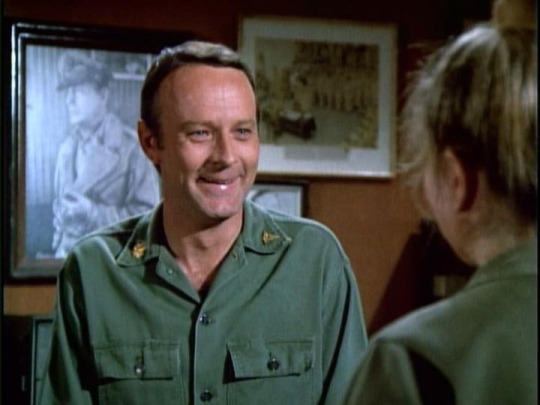
It wasn’t fair, sure. But such is life.
Like Henry and Trapper, Major Frank Burns was never forgotten by the show, or the characters, remembered all the way to the end of season eleven, his absence felt, if not missed, for the remainder of the series.
Which is a distinct dishonor not shared by the last member of the cast to depart before the series ended: Corporal Walter Eugene “Radar” O’Reilly. (Gary Burghoff)
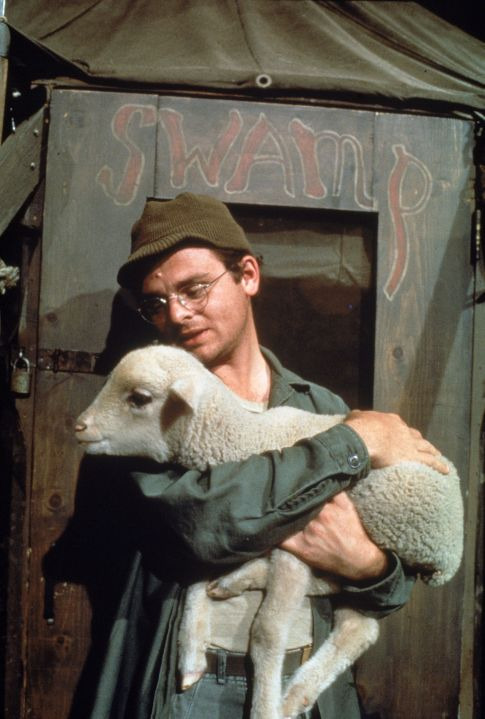
Radar was the company clerk in position, but so much more in practice. The embodiment of the Hyper-Competent Sidekick, Radar was the ‘baby of the bunch’, a naïve Country Mouse from Ottumwa, Iowa with a sneaky streak that showed itself when least expected. The character with the most obvious reason for their nickname, “Radar” had a habit of being able to sense what was about to happen, or what someone was going to say before they knew themselves. Whether he just had exceptionally good senses and reflexes or was mildly psychic, the show never said, but it’s hard to say that the 4077th didn’t benefit from his ability to anticipate the helicopters arriving with the wounded.
Radar started the show as a kid with a worldly streak and a devious side, before slowly losing these traits as the series went on, becoming more innocent and child-like by the time season four rolled around. One thing remained the same though: no matter what, Radar practically ran the 4077th by himself.
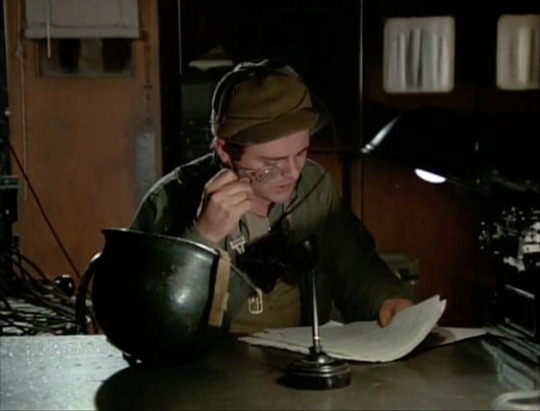
The person in charge of the paperwork, and chiefly the cog in the machine that made stuff happen, Radar’s position as the Scrounger often meant he was responsible for the critical elements in Hawkeye’s madcap schemes (in early seasons especially). Radar was always the centerpoint of competency, (the sole one until Colonel Potter showed up) despite his own quirks: sleeping with a teddy-bear and abstaining from alcohol (mostly), preferring grape Nehis, and caring for every animal that happened to cross his path. In fact, Radar’s chief Berserk Button (besides his height) was anybody harming any animals, to the point where he ended up rescuing the lamb meant for Easter dinner and shipping it stateside, not to mention his explosions of temper at the thought of Hawkeye killing his rabbit to perform a pregnancy test.
Radar tended to follow along with whatever Hawkeye and company were up to, sometimes begrudgingly and sometimes willingly, depending on the situation, always relied upon to make necessary calls and deals, file necessary paperwork, and fill in wherever necessary. In return, the rest of the unit filled in as ‘family’ for Radar, though never replacing his mother and uncle.
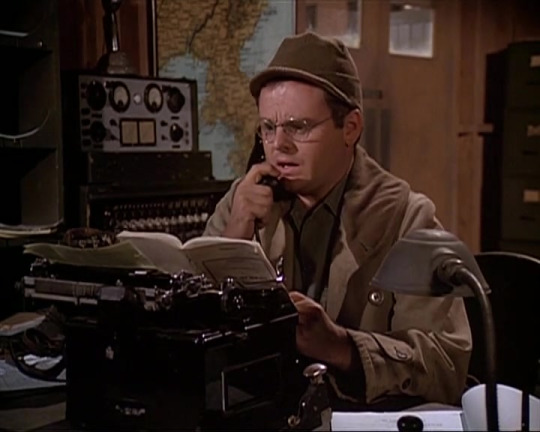
Despite his varying levels of immaturity throughout the seasons, Radar did grow up, and out from under his 4077th family (especially father figures Henry Blake and Sherman Potter). Early in season eight, Radar got the news of his uncle’s death, leaving only his mother to take care of the family farm, and received a Hardship Discharge. He got to go home.
And go home he did, although with mixed feelings about how the 4077th would get on without him. Behind him, he left the symbol of his immaturity: his teddy bear, which would later be buried by Hawkeye in a time capsule in “As Time Goes By”.
“This is my contribution. Radar left me this. Let it stand for all the soldiers who came over here as boys and went home as men.”
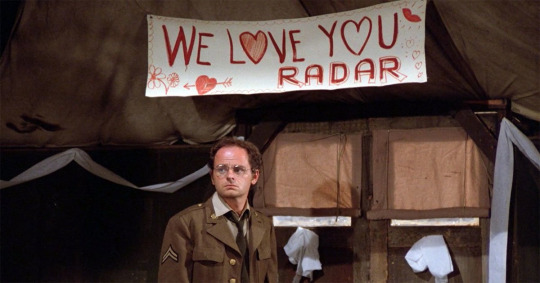
Like with Henry (also honored in “As Time Goes By” with his fishing lure), Trapper and Frank, Radar’s departure was felt by the characters, and referenced often. Unlike Henry, Trapper, and Frank, however, Radar wasn’t replaced in the cast. At least, not by a new cast member.
Instead, he was replaced by a fellow corporal, Maxwell Klinger (Jamie Farr).
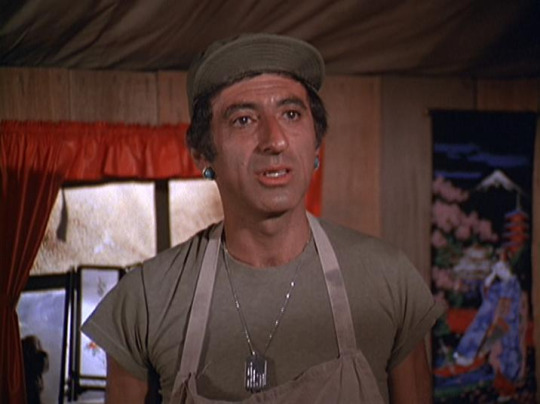
Klinger was a bit of an anomaly in the M*A*S*H cast in that he had no book counterpart from which he sprang: he was all new, added entirely for the television show. Hailing from Toledo, Ohio, Max Klinger’s primary character trait was a loathing for the army that manifested itself somewhat differently than it did in the rest of the camp.
Whereas Radar was content to complain, and B.J. and Trapper fine with moderate actions of rebellion, or even Hawkeye settling for vocal disapproval and the occasional mental breakdown, Maxwell Klinger chose to express his displeasure with the draft by doing everything humanly possible in order to get out of the army: specifically by being declared clinically insane.
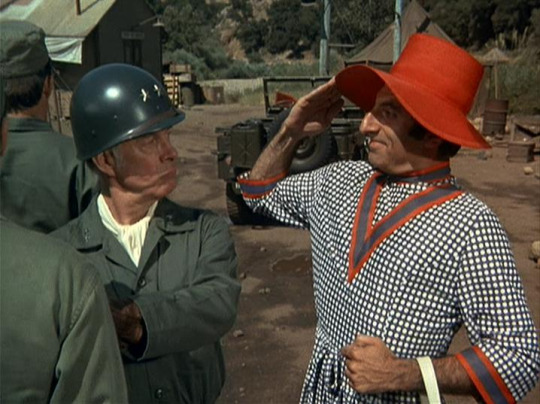
Throughout the eleven years he spent on the show, Klinger tried everything from wearing women’s clothing to pole sitting in an attempt to get a Section 8 discharge, a pass out of the army. Medical conditions, family emergencies, wearing heavy coats in a heatwave, sneaking out in a raft, hang glider, or a hearse, Klinger’s schemes regularly made up the subplot of a typical episode of M*A*S*H as he attempted to find a way to escape the military. (Oddly enough though, his schemes never got in the way of his duties.)
Klinger started out as a one-off joke character early in the first season, played deliberately in a stereotypically effeminate way. Originally meant to appear in only one episode, reception to the character was incredibly favorable, and Klinger was added to the recurring main cast, going through a little bit of a change. Actor Jamie Farr suggested that Klinger be a straight man who was just wearing dresses as though they were his uniform, and the matter-of-fact use of his unconventional wardrobe quickly became part of the character’s normal routine, looked on as perfectly normal by all except the antagonistic characters.
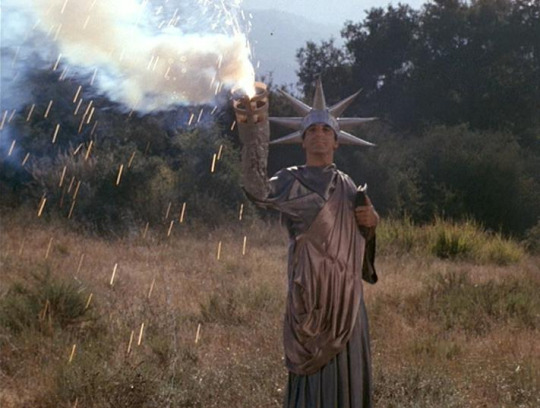
Despite starting as a one-note joke, throughout his time on the show, Klinger grew, just like the rest of them.
While never losing his intense hatred for the military and desire to get out, as time went on, Klinger became more rounded, expanding from just his ‘joke’ personality to having a larger one, demonstrating a deeply caring streak multiple times, notably when he gave Margaret his wedding dress for her marriage to Donald Penobscott. Throughout the show’s run, more time was given to develop his other attributes: his hard-luck background, his long-distance wedding and divorce, get rich quick schemes, a feud with supply Sergeant Elmo Zale, and his fears that he may actually be going crazy, explored in “War of Nerves”.
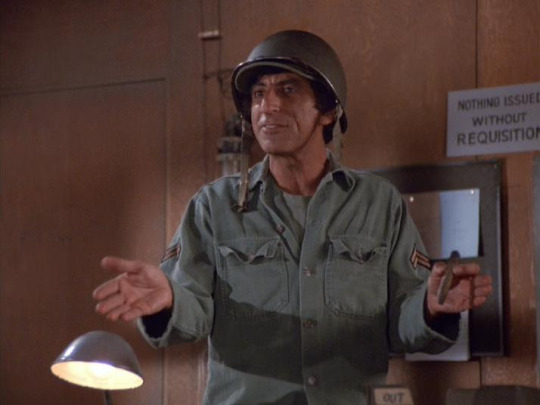
In season eight, right after Radar O’Reilly left the show, Klinger found another place on the show: replacement clerk and Scrounger.
At this point, Max’s character shifted slightly, away from the zany schemes and Obfuscating Insanity. He quit most of the section-8 schemes, notably the women’s dresses, entirely, but remaining a Guile Hero with Hidden Depths, without rescinding into the background. Initially finding it very hard to take over for the seemingly-psychic Radar, eventually Klinger settled into his new role, even getting promoted to Sergeant, before the end of the show.
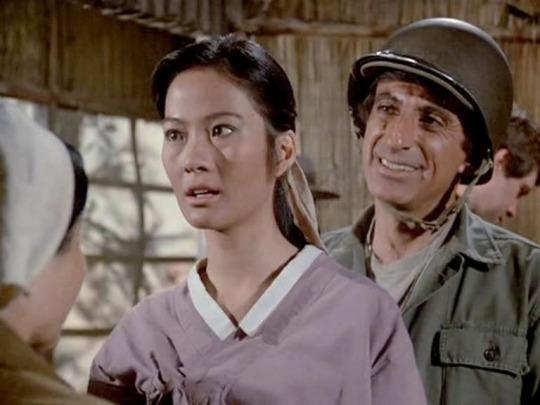
And what an end.
In “Goodbye, Farewell, and Amen”, after the war has ended, as everyone packs up to go home and says their goodbyes, Klinger makes a completely astonishing announcement: he’s staying in Korea, with his new wife, Soon-Lee. After all of that effort, all of the crazy things he’s done, from trying to eat a jeep to trying to get into West Point, when he finally gets to go home, he chooses, instead, to stay.
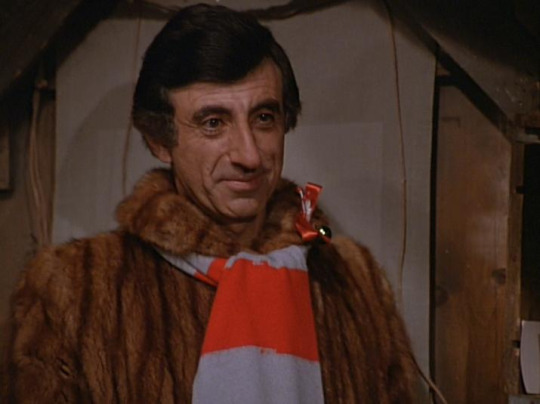
Over eleven years of show, Klinger went from a Fashionista Determinator set on getting out of the army to a clerk and sergeant, who made the decision to stay in Korea to help his wife find her family. Now that’s what I call growth, especially being one of the only characters who was there from start to finish.
In fact, there’s only one more of those we have left to discuss:
First Lieutenant Father Francis John Patrick Mulcahy (William Christopher).
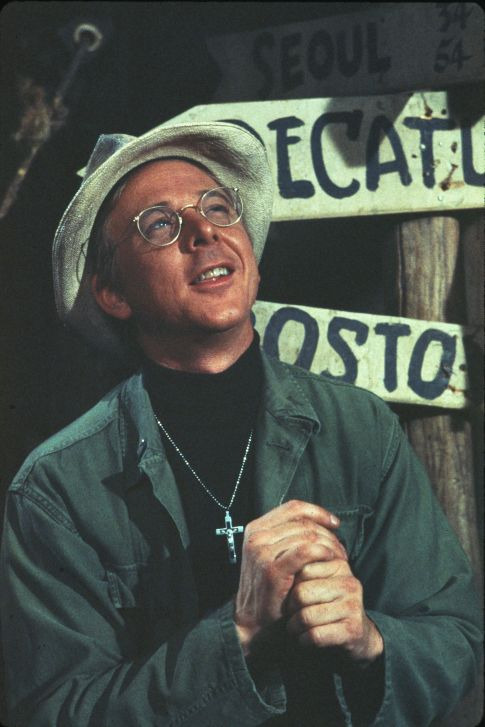
Father Mulcahy is the 4077th’s chaplain, a dedicated and devout Catholic priest, and the unit’s moral compass. Although a pacifist by nature, Mulcahy was an amatuer boxer, and occasionally demonstrated flashes of righteous fury paired with Good Old Fisticuffs.
“He’s shy, and studious, and yet he has a right hook that could stop a truck.”
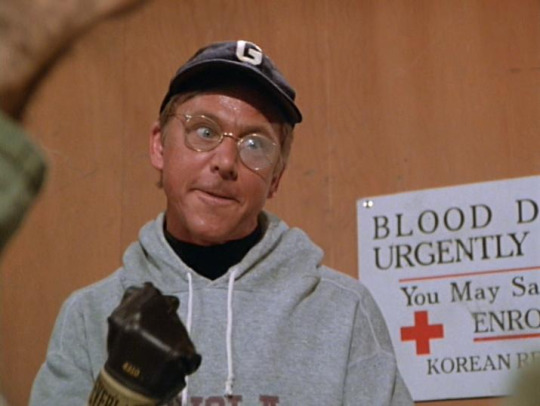
The show’s quintessential case of Beware the Nice Ones, and another Deadpan Snarker to round out the cast, Mulcahy tried to make himself useful wherever he could, often struggling with feeling like he barely contributed to the assistance offered by the 4077th.
Mulcahy and Radar often occupied the same position as the Only Sane Man in the camp, but while Radar would typically crumble under pressure to participate in whatever chaos was going on, Mulcahy tended to be aware of it, but not exactly involved in it. He was the Heart, the McCoy, a Determinator who wanted to do the right thing, at all times, focusing on his job and trying to make a difference for the better in the camp, and the war at large.
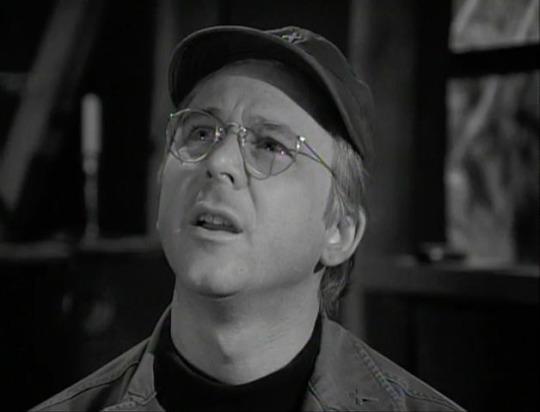
“When you lose a patient, he’s out of his misery. When I lose a patient, he’s lost his soul.”
Oddly enough, for an irreverent comedy show, Mulchay was portrayed as a good man of the cloth, a genuine person who was deeply faithful and religious, without any ‘parody’ elements or ‘joking’ instances of corruption. Mulcahy practiced what he preached, constantly trying to help those around him, notably the nearby orphanage (with the winnings of the poker games that he always seemed to win). He was no Load, and no ‘stick in the mud’, by any means, being a moral character who tolerated Hawkeye and company’s shenanigans in good humor, but had no qualms about calling the rest of the camp out when it was needed. Overall, although not developing too much throughout the show, Mulcahy was a steady constant with Hidden Depths, a much-needed upstanding character who openly displayed the courage and kindness that other characters often hid with jokes.
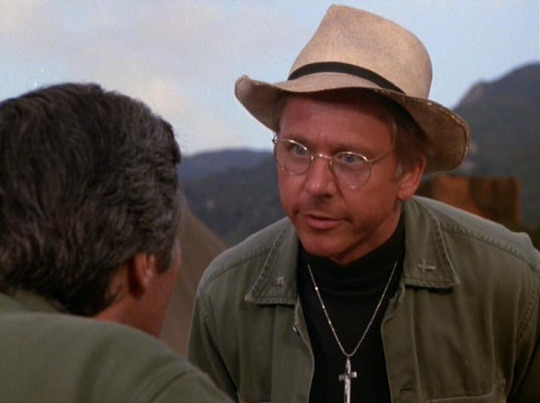
And in the end, Mulcahy got to go home too.
Like with the others, Mulcahy left Korea a changed man, visibly shaken by the horrors of war, and physically changed as well. During the finale episode, “Goodbye, Farewell and Amen”, while rescuing prisoners-of-war in the path of an artillery barrage, a shell explodes very close to him. Although Mulcahy survived the incident, he did so at the loss of most of his hearing, something that only B.J. finds out about. Mulcahy returns to the states, intending to work with the deaf, but not before saying goodbye to his 4077th flock:
“I’ll miss hearing confession, but after listening to you people for so long, I think I’ve just about heard it all.”
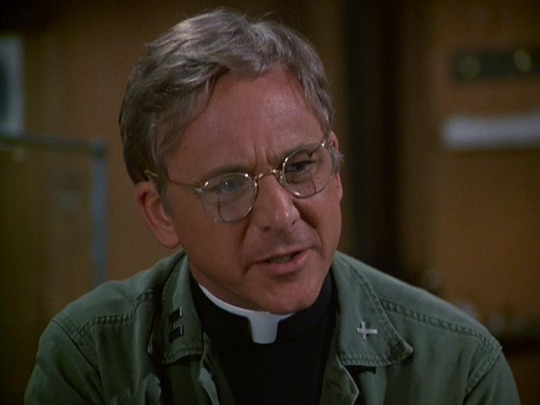
Mulcahy was the last of the main cast of characters to have begun appearances in season one, and one of only four main characters to last throughout the entire show (Hawkeye, Margaret, and Klinger being the other three), but by no means was he the last character we have to discuss. After all, for all the characters who faded out, new characters faded in to take their place, bringing their own unique color and personality to the positions they now filled.
(Join us next time, where we’ll discuss Sherman Potter, B.J. Hunnicutt, and Charles Emerson Winchester III!)
#M*A*S*H#70s#TV#Television#TV-PG#Comedy#Drama#War#Alan Alda#Loretta Swit#Jamie Farr#William Christopher#Wayne Rogers#McLean Stevenson#Larry Linville#Gary Burghoff#Mike Farrell#Harry Morgan#David Ogden Stiers#Larry Gelbart
13 notes
·
View notes